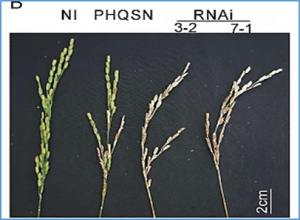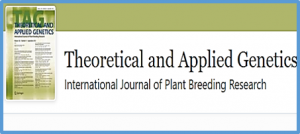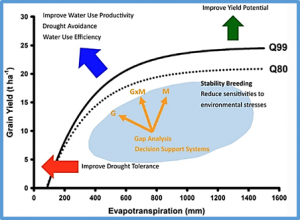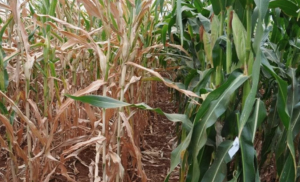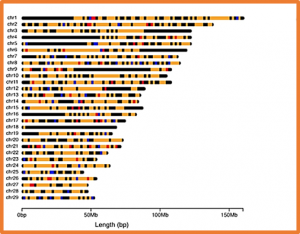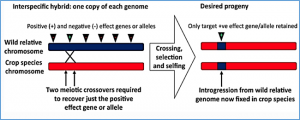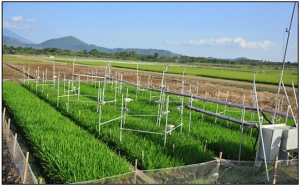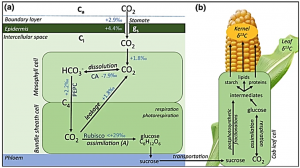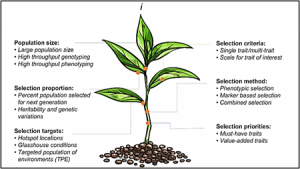In the present study, we have confirmed that the three Oxalate oxidase (OXO) genes, OsOXO2, OsOXO3 and OsOXO4 from a blast-resistant cultivar BC10 function in panicle blast resistance in rice. The expression of OsOXO2, OsOXO3 and OsOXO4 were induced by panicle blast inoculation. Subcellular localization analysis revealed that the three OXO proteins are all localized in the nucleus and cytoplasm. Simultaneous silencing of OsOXO2, OsOXO3 and OsOXO4 decreased rice resistance to panicle blast, whereas the OsOXO2, OsOXO3 and OsOXO4 overexpression rice plants individually showed enhanced panicle blast resistance.
Climate change is rapidly changing how we live, what we eat and produce, the crops we breed and the target traits. Previously underutilized orphan crops that are climate resilient are receiving much attention from the crops research community, as they are often the only crops left in the field after periods of extreme weather conditions. There are several orphan crops with incredible resilience to biotic and abiotic stresses.
Genotype-by-Environment-by-Management (G × E × M) interactions underpin many aspects of crop productivity. An important question for crop improvement is “How can breeders and agronomists effectively explore the diverse opportunities within the high dimensionality of the complex G × E × M factorial to achieve sustainable improvements in crop productivity?” Whenever G × E × M interactions make important contributions to attainment of crop productivity,
Maize (Zea mays L.) plays a critical role in ensuring food and nutritional security, and livelihoods of millions of resource-constrained smallholders. However, maize yields in the tropical rainfed environments are now increasingly vulnerable to various climate-induced stresses, especially drought, heat, waterlogging, salinity, cold, diseases, and insect pests, which often come in combinations to severely impact maize crops.
No off-target events were detected from high depth whole genome sequencing performed in precursor cell-lines and resultant calves cloned from those edited and non-edited cell lines. Long molecule sequencing at the edited site and plasmid-specific PCRs did not reveal structural variations and/or plasmid integration events in edited samples. Furthermore, an in-depth analysis of de novo mutations across the edited and non-edited cloned calves revealed that the mutation frequency and spectra were unaffected by editing status.
Climate change will have major impacts on crop production: not just increasing drought and heat stress, but also increasing insect and disease loads and the chance of extreme weather events and further adverse conditions. Often, wild relatives show increased tolerances to biotic and abiotic stresses, due to reduced stringency of selection for yield and yield-related traits under optimum conditions.
In rice, a small increase in nighttime temperature reduces grain yield and quality. How warm nighttime temperatures (WNT) produce these detrimental effects is not well understood, especially in field conditions where the typical day-to-night temperature fluctuation exceeds the mild increase in nighttime temperature. We observed genome-wide disruption of gene expression timing during the reproductive phase in field-grown rice panicles acclimated to 2 to 3 °C WNT.
In the context of a changing climate, drought is one of the major factors limiting plant growth and yield. Hence, breeding efforts are directed toward improving water use efficiency (WUE) as a key factor in climate resilience and sustainability of crop production. As WUE is a complex trait and its evaluation is rather resource consuming, proxy traits, which are easier to screen and reliably reflect variation in WUE, are needed.
The characterization of tissue-specific promoters is critical for studying the functions of genes in a given tissue/organ. To study tissue-specific promoters in soybean, we screened tissue-specific expressed genes using published soybean RNA-Seq-based transcriptome data coupled with RT-PCR analysis. We cloned the promoters of three genes, GmADR1, GmBTP1, and GmGER1, and constructed their corresponding β-Glucuronidase (GUS) promoter-GUS reporter vectors
Accelerating genetic gain in crop improvement programs with respect to climate resilience and nutrition traits, and the realization of the improved gain in farmers’ fields require integration of several approaches. This article focuses on innovative approaches to address core components of the breeder’s equation. A prerequisite to enhancing genetic variance (σ2g) is the identification or creation of favorable alleles/haplotypes and their deployment for improving key traits.


 Curently online :
Curently online :
 Total visitors :
Total visitors :
